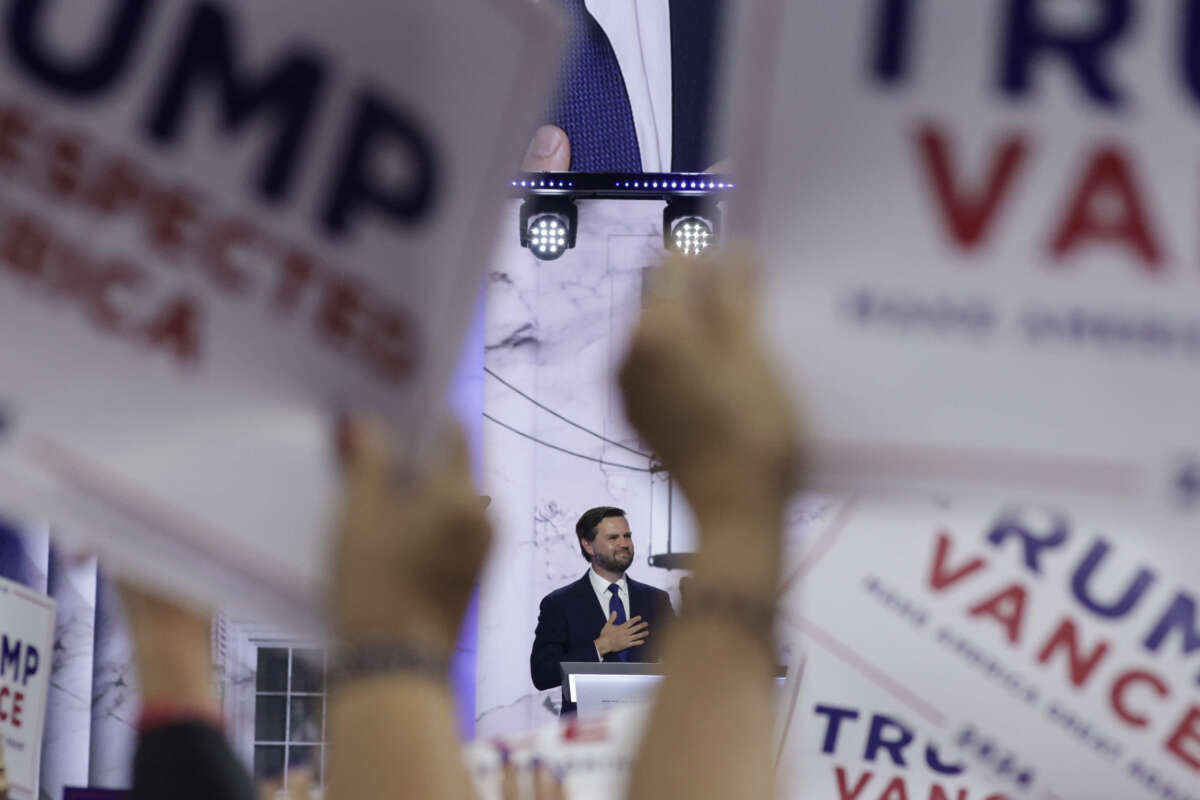Support justice-driven, accurate and transparent news — make a quick donation to Truthout today!
Polling on American voters’ opinion of GOP vice presidential nominee J.D. Vance is causing political observers to question whether Republicans are having buyer’s remorse over selecting him to run alongside Donald Trump in the 2024 election.
Trump hasn’t yet voiced any negative feelings toward his running mate, whom he personally selected and the party confirmed through a vote at its convention last week. But the selection of the Ohio Republican senator, who doesn’t even have two years under his belt in public office, was a curious one — Vance isn’t from a swing state, and he isn’t viewed as likely to bring in new support from voting blocs that Trump needs to win.
Indeed, the selection “was [born] of cockiness, meant to run up margins with the base in a blowout rather than persuade swing voters in a nail-biter,” wrote The Atlantic’s Tim Alberta, who noted that the strategy was developed prior to President Joe Biden dropping out as the Democratic nominee.
Now that Vice President Kamala Harris is the presumptive nominee for Democrats, Vance’s selection doesn’t seem to be very strategic. Meanwhile, polling is demonstrating that as voters get to know more about Vance, they become less receptive to him and his views.
Some Republicans have privately expressed regret over Trump picking Vance.
“The road got a lot harder. He was the only pick that wasn’t the safe pick. And I think everyone has now realized that,” one House Republican told Axios.
“On the whole, the feeling is: doesn’t add much,” another member of the House GOP conference said. “And now with Kamala at the top, the capacity to have expanded the map a little bit … would have been much more beneficial.”
Vance has, in fact, become something of a liability for Trump. Aggregate polling data collected by CNN’s senior political data reporter Harry Enten noted that Vance has a net favorability rating of -6 points. That number is the lowest of any vice presidential nominee for either major party since 1980, and the first time such a nominee has been in the net-negative range in the week after their party’s national convention. (Vice presidential nominees have seen, on average, a +19 net favorability rating in the days after their conventions were held.)
An Economist/YouGov poll, published after Enten’s aggregate was compiled, exemplifies the GOP’s problems with Vance. Among Americans overall, only 34 percent give him a favorable rating, while 42 percent view him unfavorably, a net rating of -8 points. Nearly a quarter of respondents (23 percent) said they didn’t know enough about Vance to form an opinion.
“Frankly, I don’t really understand the pick,” Enten said recently on the decision to select Vance.
Vance has done himself no favors recently by making public appearances alongside polarizing figures — at a recent campaign rally, for example, he was introduced by a state representative of his hometown of Middletown, Ohio. That lawmaker suggested that a civil war may be needed if Trump and Vance lose the presidential race to Democrats in the fall, a notion that Vance failed to disavow.
If Trump and/or Republicans eventually determine that they do have buyer’s remorse over Vance, there isn’t much they can do about it: Republican National Committee (RNC) bylaws do not allow a person at the top of the ticket, nor the party itself, to remove a vice presidential candidate once they are selected. Trump could pressure Vance, who has frequently kowtowed to him in the past, to voluntarily step aside, after which the RNC could hold a meeting to select a replacement vice presidential candidate (likely someone who Trump had already selected beforehand). But if Vance doesn’t cooperate, the RNC can’t force him to leave the ticket.
There is one caveat: The party could amend its bylaws, if three-fourths of committee members vote to do so, to allow a new provision that would let them remove a vice presidential running mate. But if that’s the route they want to take, it will have to be done quickly, as deadlines for naming the nominees in a number of states are fast approaching.
A terrifying moment. We appeal for your support.
In the last weeks, we have witnessed an authoritarian assault on communities in Minnesota and across the nation.
The need for truthful, grassroots reporting is urgent at this cataclysmic historical moment. Yet, Trump-aligned billionaires and other allies have taken over many legacy media outlets — the culmination of a decades-long campaign to place control of the narrative into the hands of the political right.
We refuse to let Trump’s blatant propaganda machine go unchecked. Untethered to corporate ownership or advertisers, Truthout remains fearless in our reporting and our determination to use journalism as a tool for justice.
But we need your help just to fund our basic expenses. Over 80 percent of Truthout’s funding comes from small individual donations from our community of readers, and over a third of our total budget is supported by recurring monthly donors.
Truthout has launched a fundraiser to add 340 new monthly donors in the next 5 days. Whether you can make a small monthly donation or a larger one-time gift, Truthout only works with your support.
